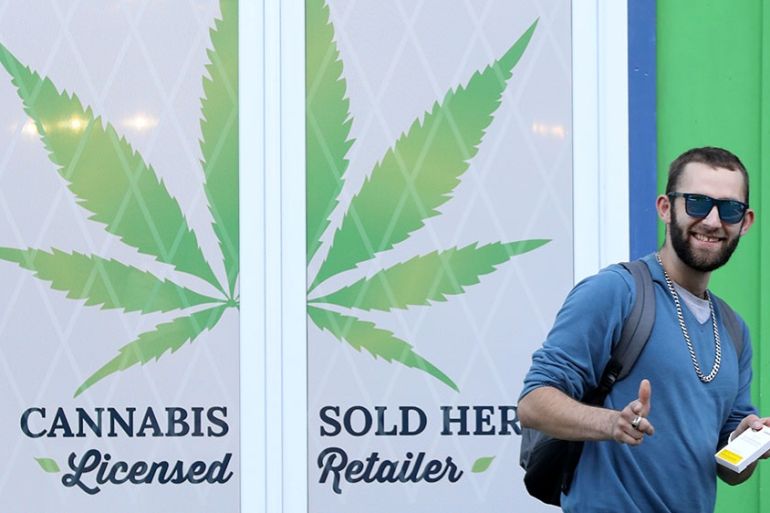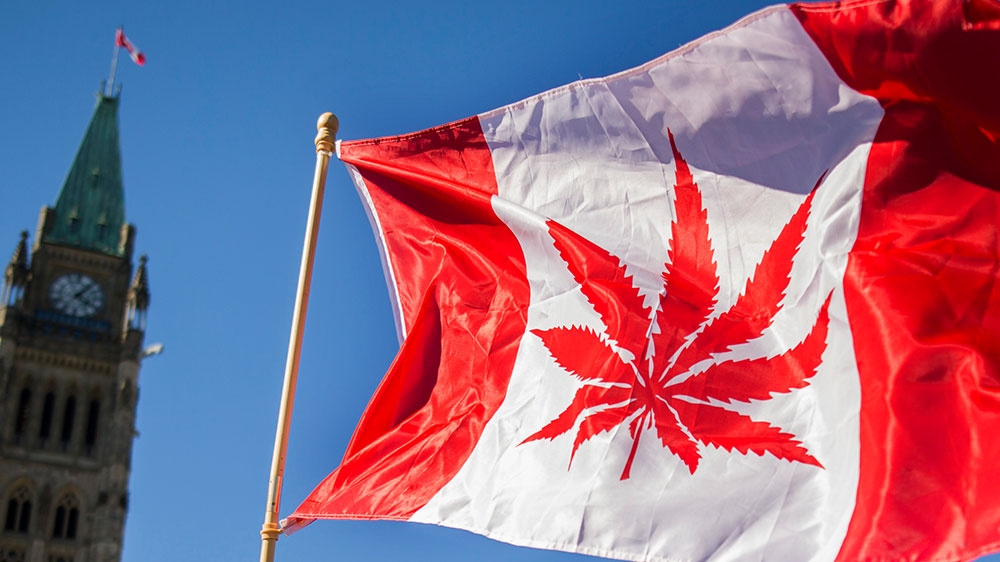Cannabis shops do a roaring trade on their first day in Canada
Canada becomes second and largest country in the world to legalise the recreational use of the drug.

Montreal, Canada – Hugo Senecal wanted to be the first.
That’s why he got in line at 3:45am to buy recreational cannabis – legally.
“It’s a symbolic move. Cannabis is legal here in Canada, so I wanted to be the first one to make the first legal purchase in Montreal – and I think I’m going to be the one,” said Senecal, 39, who has a medical marijuana license.
On Wednesday, Canada became the second and largest country in the world to legalise cannabis for recreational purposes. Uruguay was the first.
Canada’s move came after months of preparations and legislative wrangling.
“It’s an awesome day in Canada right now. It’s like Christmas and New Year’s and my birthday, all in one day,” Senecal told Al Jazeera, sitting in a foldable chair outside one of three stores selling recreational cannabis in the city.
About 90 minutes before the store opened, 60 or so people were lined up on the pavement in the heart of downtown Montreal. The line curled around the block as people waited to get into the store, which sits next door to a pharmacy.
![Hugo Senecal was first in line at a store in Montreal [Jillian Kestler-D'Amours/Al Jazeera]](/wp-content/uploads/2018/10/9453e71f7b184acf9652c4b5ff1e947d_18.jpeg)
A green banner hung above the door, inscribed with the name of the government-run cannabis agency, the Quebec Cannabis Society (SQDC, according to its French acronym), and a large glass window gave passersby a peek inside.
The phrase, “For responsible consumption”, was painted on a wall behind the cash registers.
Inside, people can use touch screens to browse different strains of cannabis that are for sale, get information from government-trained clerks, and then place their order with a cashier, who then goes to fetch the products, local media reported earlier this week.
Each item comes with a government seal – the word cannabis above a red Maple leaf – and people can also make their purchases online, or at more than 100 stores the Associated Press reported would be open across the country.
![More than 100 cannabis stores opened across the country on Wednesday, the Associated Press reported [Jillian Kestler-D'Amours/Al Jazeera]](/wp-content/uploads/2018/10/bc069fae2e6b4b92ae34cdddda18ff52_18.jpeg)
Thomas MacDonald, 22, said he came to the downtown Montreal store mainly out of curiosity. Originally from Boston, but now living in Montreal, MacDonald said he hoped the US would follow Canada’s lead and legalise the recreational consumption of cannabis.
“I think this is a really awesome solution to a lot of problems and I think the US should follow,” he told Al Jazeera, pointing to the way low-level drug crimes clog up the US justice system while also disproportionately impacting people of colour.
He said the mood was one of excitement, tinged with some apprehension. “I think no one really knows what happens today,” he said.
Canadians support legalisation
Canadian Prime Minister Justin Trudeau campaigned in 2015 on a promise to legalise cannabis. Since he was elected, he has defended legalisation as a way to get cannabis out of the hands of youth and push organised crime out of the industry.
But it’s also a way for the Canadian government to earn tax revenues – and the cannabis business is booming, generating interest from investors the world over.
Most Canadians appear on board with legalisation, too. On Monday, polling firm Abacus Data reported that 70 percent of Canadians – across all parts of the country and political affiliations – support or can accept legalisation.
That’s due to “the fact that a good number of people have tried the product and/or know people who use cannabis, that using cannabis is no worse than using alcohol, and that the regulatory approach taken to date seems to be judged positively”, the agency said.
In August, Statistics Canada reported that 16 percent of Canadians above age 15 used cannabis in the previous three months.

The ins and outs of legal cannabis vary by province, with each legislature setting its own rules for where marijuana can be sold and consumed, the price and type of cannabis products that will be available, and minimum age requirements.
In Ontario, Canada’s most populous province, residents can carry up to 30 grams of cannabis and keep up to four plants in their homes.
However, Ontarians are only currently allowed to buy the product online, after the province’s Conservative government introduced legislation that would change the policies adopted by its predecessor on where cannabis will be sold.
In Quebec, people will be able to possess up to 30 grams, as well, and buy it in licensed stores and online, but it’s illegal to grow your own marijuana at home. Quebec’s newly elected, right-wing government also says it plans to raise the legal age to buy cannabis from 18 to 21.
In most other provinces, it will be legal to buy cannabis at 18 or 19 years old.
In New Brunswick, on Canada’s east coast, the government’s licensed cannabis stores have even put together a step-by-step guide for how to roll a perfect joint.
Questions remain
As Canada‘s legal cannabis policies continue to roll out over the next months and years, people across the country will be paying close attention. Several major questions remain unanswered, as well.
Will licensed retailers have enough cannabis to satisfy demand, and will their staff have been adequately trained to answer consumers’ queries? Can police fairly make sure people don’t smoke and drive? Will the prices set at provincial stores be competitive enough to really cut into the black market?
Bill Blair, the minister of Border Security and Organized Crime Reduction and Toronto’s former chief of police, said on Sunday that regulations around the sale of cannabis edibles would be brought forward in the next 12 months.
People have also raised concerns about whether buying cannabis legally in Canada could get them banned from entering the United States, where it remains illegal at the federal level. On Tuesday, US Customs and Border control reiterated that those caught at the border with Canada with marijuana would be subject to arrest.
![Each item comes with a government seal, the word cannabis above a red Maple leaf [Martin Ouellet-Diotte/AFP]](/wp-content/uploads/2018/10/db924871347a40e9adc56074b59f0aa1_18.jpeg)
A campaign to push Ottawa to grant amnesty to people convicted of marijuana-possession charges has also gained steam in the lead-up to legalisation.
On Wednesday morning, the federal government announced it would introduce legislation to grant pardons to Canadians convicted of simple cannabis possession charges and who have completed their sentences.
“We intend to keep the application process as simple as it can be,” Public Safety Minister Ralph Goodale told reporters.
Akwasi Owusu-Bempah, an assistant sociology professor at the University of Toronto who supports the amnesty campaign, told Al Jazeera before the announcement that “cannabis law enforcement has historically had a disproportionate impact on Canada’s indigenous, racialised and marginalised populations”.
“Although cannabis use is widespread in Canada the burden of a criminal record for minor cannabis possession has fallen onto these groups,” he said in an email.
‘Life will go on’
Earlier this week, the Canadian Medical Association Journal described legalisation as “a national, uncontrolled experiment” that pits “the profits of cannabis producers and tax revenues … against the health of Canadians”.
It said Ottawa should amend its marijuana legislation should cannabis consumption increase as a result of legalisation.
But ultimately, “life will go on much like it did before”, said The Globe and Mail newspaper’s health columnist, Andre Picard, on the eve of legalisation.
“Cannabis is not the devil’s weed. Nor is it a magic elixir. Come Wednesday, the country will not go mad as stoners take over the streets, nor will we achieve doobie-inspired world peace and universal love,” Picard wrote.
Like alcohol, cannabis “is used responsibly by most people … and will continue to be”, he wrote.